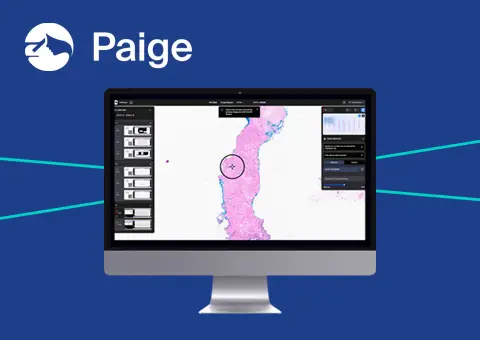“A platform designed for pathologists with AI in mind is really at the core of how we help pathologists with their efficiency and overall confidence”
Artificial Intelligence (AI) has become commonplace in many industries, yet medical fields and life sciences have been cautious with their adoption. Perhaps rightfully so, as there is a stark difference between the kind of AI that can power an iPhone app, and the kind of AI that can accurately, safely, and effectively provide clinical decision support. How the AI is built, trained, and validated determines whether it is fit for clinical use, and is incredibly important to keep top of mind when choosing AI partners.
Another important consideration is approval from the Food and Drug Administration (FDA). While approved AI in a field like radiology, for example, has grown rapidly and been adopted at scale, fields like pathology have only just begun to tap into the wide range of benefits that AI can provide. In 2021, the FDA granted the first de-novo market authorization of an AI-powered pathology product for in vitro diagnostic (IVD) use. With that, a massive shift in pathology has begun toward more readily available clinical-grade AI, wider pathologist use, and benefitting from the many impacts these technologies can have on patient care.
Clinical Grade AI: What’s the Difference?
Not all AI is created equal. For an AI application to be clinical grade, it must, first and foremost, run with high diagnostic accuracy. This requires training on a robust dataset with representative tissue samples from diverse institutions. Such data ensures that the AI can generalize regardless of any slide artifacts or variations, at any institution, without the need for additional tuning. Secondly, it must deliver these results rapidly. The AI should be able to run in the background so that when a pathologist is ready to read a case, the results are there with just a click. The platform on which the AI is run must also be interoperable with multiple scanners, LIS systems, and any other technologies in use within the regular diagnostic process. Without this, the AI will not sit seamlessly in the pathology workflow and will not be able to deliver on its promise of increasing pathologist efficiency. Designing the AI specifically with the pathologist in mind, on the other hand, will ensure it can successfully help decrease the time involved in clinical diagnoses, as well as reduce diagnostic error.
A New Era in Digital Pathology
FDA approval is another important step in certifying that the AI’s quality, generalizability, and security are of the caliber pathologists can trust. In 2021, the FDA underwent the first validation of an AI product for clinical pathology use, Paige Prostate Detect. After several years of collaboration and analysis, culminating in an extensive study where samples from 218 institutions were reviewed by 16 pathologists with landmark results, the FDA granted marketing authorization for Paige Prostate Detect.
This approval makes broad adoption of AI for decision support in pathology significantly easier. For one, the burden of LDT validation for labs, which is typically quite substantial especially at labs with multiple sites, is reduced. Additionally, legal and medical risk as well as the responsibility of quality management system control is shifted to the AI vendor rather than being placed on the individual lab. IT infrastructure and security similarly become a collaborative effort between the lab and the vendor, again reducing the cost and manpower required to create an approved system. All of this makes for a safe and efficient lab environment, and when labs are efficient, patients benefit. The ability to return confident diagnoses back to the patient care teams in a timely manner can ultimately save lives.
The FDA approval process has additionally set an important high standard for future AI technologies, ensuring that as many more will begin to come to market, they will remain trustworthy, generalizable, and able to operate in a clinical setting without concern. This gives pathologists the additional confidence they need to use AI to quickly and confidently sign out cases.
Paige Prostate Detect: The Only FDA Approved AI in Digital Pathology*
Paige Prostate Detect is the first and currently only AI-powered pathology solution to receive FDA marketing authorization for in vitro diagnostic (IVD) use in detecting cancer in prostate needle biopsies. Developed with over 33,000 whole slide images of prostate needle biopsies from the oldest and largest cancer treatment center, Memorial Sloan Kettering, and further validated on thousands of slides from institutions all over the globe, Paige Prostate Detect is designed to work at any histopathology lab without additional tuning.
The AI rapidly reads a whole slide image and identifies regions of interest with the highest likelihood of harboring cancer, then pointing the pathologist to the area with highest probability of cancer for further review. This can help pathologists to make their diagnoses with greater efficiency and greater confidence. In one 2021 study, Paige Prostate Detect showed close to 100% sensitivity for detecting cancer at the patient level, and helped reduce pathologists’ time to diagnosis by 65%.1
Learn more about Paige Prostate Detect, as well as Paige’s suite of Prostate applications and Breast applications, with a custom demo: https://paige.ai/demo/
References:
- da Silva, Leonard M., et al. “Independent real-world application of a clinical-grade automated prostate cancer detection system.” Journal of Pathology 254.2 (2021): 147-158.
*In the United States, Paige Prostate Detect (DEN200080) is approved for clinical use with Philips Ultrafast Scanner. Otherwise, all Paige Prostate Suite applications use are limited to Research Use Only and not for use in diagnostic procedures.

